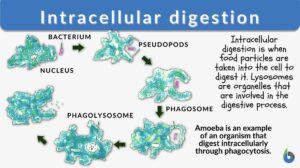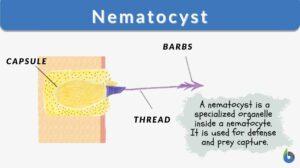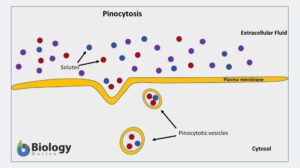Search Results for: exocytosis
Endocytosis
Endocytosis Definition What is endocytosis in biology? Endocytosis is a cellular process by which a cell internalizes any... Read More
Plasma membrane
Do all cells have a plasma (or cell) membrane? Yes, all cells have a biological membrane that separates the protoplasm from... Read More
Phagocytosis
Phagocytosis Definition Phagocytosis is a basic physiological cellular process wherein a cell ingests a solid particle... Read More
Movement of Molecules Across Cell Membranes
Diffusion Diffusion is essentially the movement of molecules from a region of higher concentration to a region of lower... Read More
Cell membrane
Cell Membrane Definition Just like any non-living body possesses a plastic or paper packaging material that keeps the... Read More
Endomembrane system
Ever wondered how biomolecules are made within the cell and then they are released outside the cell for use by the body?... Read More
Axon terminal
An axon terminal is any of the button-like endings of axons through which axons make synaptic contacts with other nerve... Read More
Apocrine gland
The human body is a complex assemblage of many different organs, systems, glands, bones, and tissues. Weighing any one over... Read More
Exocytosis
When materials leave the cell by the membrane "spitting it... Read More
Sarcolemma
Sarcolemma Definition What is the sarcolemma? It is the thin, transparent, extensible plasma membrane of the muscle cell.... Read More
Intracellular digestion
Intracellular Digestion Definition What is intracellular digestion? ‘Intra’ means "inside" and ‘cellular’ pertains... Read More
Neurophysiology
Definition noun A branch of neuroscience that is concerned with the physiology of the nervous system Supplement Neuroscience... Read More
Stratum granulosum
Definition noun The thin layer of the epidermis comprised of granular keratinocytes that migrated from the stratum... Read More
Digestion and Absorption of Food
The gastrointestinal (GI) system includes the gastrointestinal tract (mouth, pharynx, esophagus, stomach, small intestine,... Read More
Circulation
Blood Blood is composed of a liquid, plasma, and blood cells such as erythrocytes (red blood cells,) leukocytes (white... Read More
Neural Control Mechanisms
Nerve cells called neurons generate electric signals that pass from one end of the cell to another and release chemical... Read More
Genetic Information and Protein Synthesis
Genetic Code Genes are sequences of DNA nucleotides that carry and transmit the information specifying amino acid sequences... Read More
Phagolysosome
Definition noun plural: phagolysosomes (cell biology) A cytoplasmic body that forms from the fusion of phagosome and... Read More
Cytokinesis
The cell cycle of eukaryotes is a cyclical series of biological events that certain asexual cells go through. The cell cycle... Read More
Chondrocyte
Definition noun, plural: chondrocytes A cell occupying a lacuna in the extracellular matrix of the cartilage Supplement The... Read More
Merocrine gland
Definition noun, plural: merocrine glands A type of exocrine gland in which the secretory products are released without... Read More
Hyperosmotic
Hyperosmotic Definition What is hyperosmotic? The word hyperosmotic is derived from two Greek words: 'hyper', meaning... Read More
Cross-linking
Cross-linking Definition Cross-linking, in general, means the forming of cross-links between the joining structures. In... Read More
Nematocyst
All organisms are composed of millions of cells. Many cells serve specific purposes and are specialized to do distinct... Read More
Pinocytosis
Pinocytosis Definition What is pinocytosis? Pinocytosis is the ingestion of extracellular fluids, i.e. the fluid... Read More
























